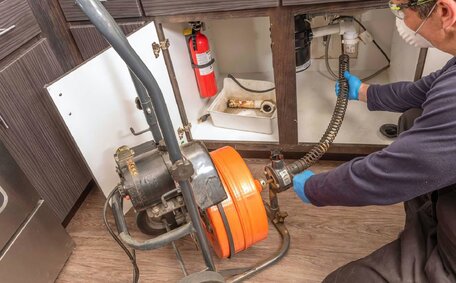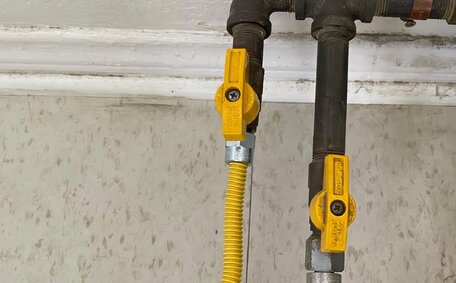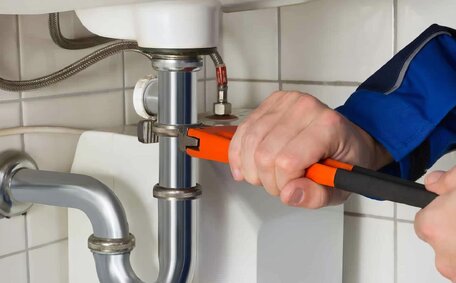Introduction to Drain Blockages
Blocked drains can lead to backed-up sinks, unpleasant smells, and even flooding. Promptly addressing these issues is essential for restoring your drainage system’s functionality.
This article will discuss typical causes of blocked drains, signs of drainage problems, and methods to unblock drains yourself or discern when to seek professional assistance. We’ll cover DIY approaches using boiling water, baking soda, vinegar, plungers, and drain snakes. Tips are included to prevent future blockages.
Our goal is to guide you on how to quickly, safely, and cost-effectively unblock drain systems. By understanding the estimated time various methods take, you’ll know how do you clear a blocked drain by yourself or decide how soon to contact a plumber if problems persist.
Common Causes of Clogged Drains
Common causes of home drain blockages include:
- Accumulated combinations of hair, soap residue, and other debris getting trapped
- Pouring substances such as cooking oil and grease down the drain, leading to solidification and water flow obstruction
- Flushing unsuitable items down toilet like baby wipes or dental floss, causing blockage in your pipes
- Tree roots intruding into and obstructing your external drain pipe
- accumulation of wastewater, dirt, and silt over time
Your kitchen sink, alongside bathroom sinks, showers, and floor drains can become havens for accumulations of soap scum that leave your drain blocked. An outside drain is also prone to get stuck with leaves, mud, and extraneous materials.
To minimize the risk of blockages, use sink strainers to catch debris and dispose of cooking oil in the bin. Composting food scraps is an eco-friendly way to reduce waste.
DIY Methods to Try Unblocking a Drain
Before considering specialized solutions, homeowners can try several safe DIY methods to unblock drains:
Using a Plunger
Using a plunger can generate sufficient suction to displace blockages.
Place the plunger over the drain and vigorously pump it 10-15 times to push the clog through. Repeat as needed and if the drain clogged try covering overflow holes with a wet cloth to improve suction. Plunging can propel obstructions down, helping you rapidly address your drain as a first response option.
Boiling Water
Boiling water, due to its high temperature, can dissolve substances like grease and hair in the drain.
For better results, add some dish soap as a lubricant before the boiling water to help dissolve the clog more effectively.
Baking Soda and Vinegar
Mixing a generous amount of baking soda with vinegar produces a fizzing reaction that helps to break down drain debris.
Pour a cup of baking soda followed by white vinegar down the drain, creating a bubbling reaction that helps disperse and dissolve clogs. After letting the mixture sit for a few minutes, flush with boiling water to remove any remaining residue.
You can safely repeat these methods a few times when attempting to clear blocked drains before you need to call plumber professionals. If you detect a high water level or can’t dislodge the clog, you may wonder what can be done about a drain that is beyond a basic DIY fix and requires a plumber’s expertise.
Using Household Tools to Unclog Drains
Before calling a plumber, common household items may help alleviate stubborn drain blockages:
Wire Hanger
A straightened wire hanger can be inserted into the drain and maneuvered to dislodge simple clogs.
Wearing gloves for protection, move the hanger back and forth within the drain to dislodge debris.
Drain Snake
For deeper clogs, a drain auger is effective in reaching and clearing the obstructed areas. Slowly twist the snake to navigate the clog, pushing debris along until the drain is clear. Maintain caution to not scratch or damage your pipe interiors when probing about 3 feet down.
For severe clogs that household items cannot address, a professional may use jet technology with industrial strength drain jetters and hydro-jetting equipment to clear obstructions and restore flow in your pipes.
Homemade Drain Cleaners You Can Make
You can easily use readily available household ingredients to make non-toxic drain cleaners at home, aiding in an affordable, green unclogging process.
Baking Soda and Vinegar Drain Cleaner
A highly effective home remedy for unblocking drains involves using a mixture of baking soda and vinegar. Let it sit for 5-10 minutes before rinsing with hot water.
Start by pouring a cup of baking soda, then hot white vinegar down the drain to effectively tackle clogs. The resulting chemical reaction will aggressively bubble up, helping to dissolve accumulations, like hair and various residues.
Salt and Baking Soda Drain Opener
For a more abrasive homemade drain cleaner, combine equal parts of salt and baking soda (half a cup each) and pour the mixture into the drain. Let it sit for a few hours or ideally overnight, then pour down the drain with boiling water to wash away debris. The salt grains act as a gentle scouring agent.
These non-toxic solutions illustrate how you can try to tackle drain challenges without resorting to harsh commercial products. Over time, their regular monthly use can help prevent clogs and keep drains free-flowing.
When to Call a Professional Plumber
While effective DIY methods exist, some issues may require professional attention for your plumbing system. If drain blockages persist despite multiple attempts at home remedies, it’s best to call in a plumbing service expert.
Indications it’s time to call Abbotsbury Plumbing for a blocked drain include:
- Water is backing up out of floor drains or your sinks getting blocked
- Strange gurgling sounds from the pipes, signalling a potential blockage in your home
- Noticeable damp spots in walls or ceilings from possible leaks
- Bad sewage odours emerging around your home, indicating potential drainage issues
- If attempts with plungers, drain snakes, baking soda, and vinegar fail, it’s time to seek professional assistance.
For persistent blockages, our licensed technicians employ powerful tools and sewer cameras for inspection and repair.
For prompt and reliable emergency drain cleaning services in the Abbotsbury area, contact our plumbing pros at 1300 349 338 or jobs@abbotsburyplumbingservices.com.au.
What Plumbers Do to Unblock Drains
When there’s no relief from stubborn drain problems after DIY attempts, professionals use industrial-grade tools to unblock drains, ensuring restoration of proper water flow.
High-Pressure Hydro Jetting
One common approach plumbers use is to employ a high-pressure jet, such as hydro jetting. These fast-acting high-pressure water jets can blast through blockages that are more than a match for other attempts. Jets can efficiently clear blockages and scour away grease, soap buildup, and invasive tree roots in your pipes.
Sewer Cameras & Locators
Using drain cameras like CCTV, plumbers are able find the precise location, severity, and source of stubborn clogs in the drain. Electromagnetic locators can save your sewer line effortlessly, pinpointing blockage hotspots with absolute precision.
Precise camera footage guides their hydro jetting and clearing work. It also checks for pipe damage needing repair.
Sewer & Drain Augers
Stubborn obstructions may require mechanical snake augers to cut through and extract the blockage. Manual feed augers give plumbers more control and can prevent damage your home compared to household drain snakes. Industrial strength powered augers with rotating drill heads chew through most clogs including thick tree roots.
At Abbotsbury Plumbing, we invest in the latest plumbing innovations like pipe relining to providepermanent drain solutions. Contact us on 1300 349 338 to unclog blocked drains.
Average Costs of Professional Drain Unblocking
When a persistent drain blockage requires professional help, costs to hydro jet or mechanically auger it clear typically range from $150 - $350 depending on pipe accessibility. More complex jobs involving inspections or repairs for drainage issues can run $500 - $1000+. Quotes vary case by case.
Competitive rates rule out any further question, much does cost to utilise our latest equipment to efficiently unblock drains. We focus on long-term solutions, not quick band-aid fixes.
Our expert assessments enable you to take informed action and avoid superfluous work. If issues such as extensive tree root damage or pipe fractures are detected, your local experts provide tailored solutions to sort out the damage in line with your budget.
Preventing Future Drain Blockages
There are several habits homeowners can adopt to help prevent recurrent drain clogs and keep plumbing functioning smoothly long-term:
Use Drain Strainers
Install strainers in sinks and tubs to keep out hair, food scraps, and other debris, thus safeguarding against blockages. Empty strainers regularly to prevent materials from going into drain.
Limit Grease/Oil Down Drains
Ensure that cooked fats, oils, and grease cool and solidify before discarding them in the trash instead of the drain. Even small amounts can cause blockages over time.
Only Flush Toilet Paper
Avoid flushing substances other than toilet paper and natural waste to ensure a blocked drain can be prevented. Items like baby wipes, cotton swabs, dental floss, and condoms cause havoc into your pipes.
Install Outdoor Drain Covers
No matter the season, Safeguard your premises by shielding external drainage systems from debris with effective drain cover and gutter guards.
Clean With Eco Products
Choose non-toxic drain cleaner options like baking soda and vinegar instead of harsh chemical drain cleaners that harm pipes.
Routine Maintenance
Schedule annual drain inspections and cleaning services to clear any minor buildups before major blockages occur. We offer affordable maintenance plans.
Adopting these preventative measures can reduce the likelihood of significant unblocking tasks in the future. Contact Abbotsbury’s friendly plumbers at 1300 349 338 or jobs@abbotsburyplumbingservices.com.au for professional tips keeping drains clear.






